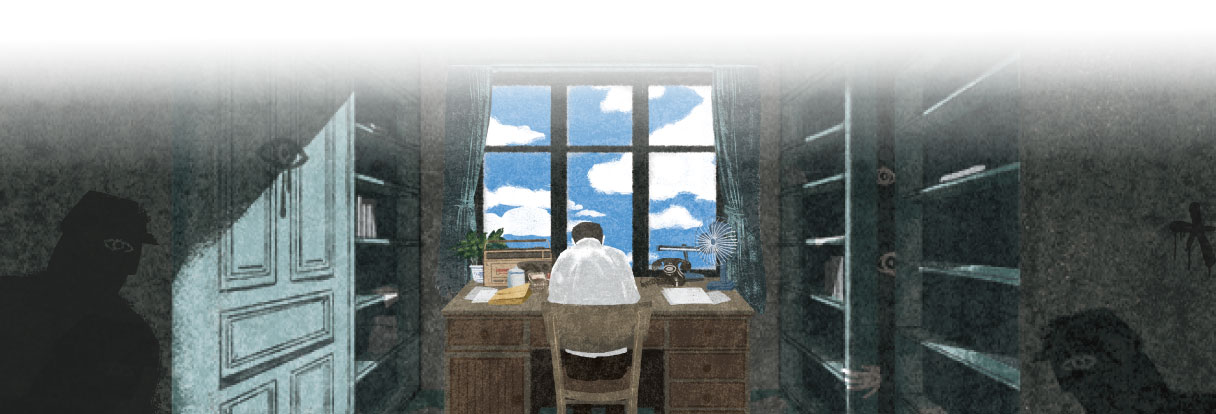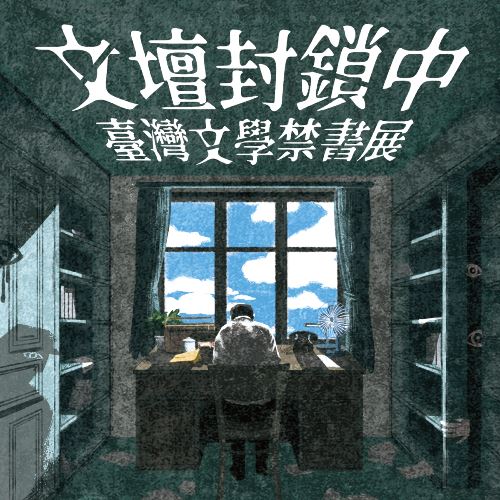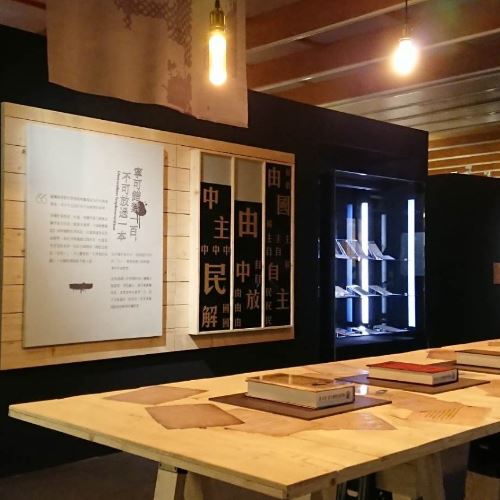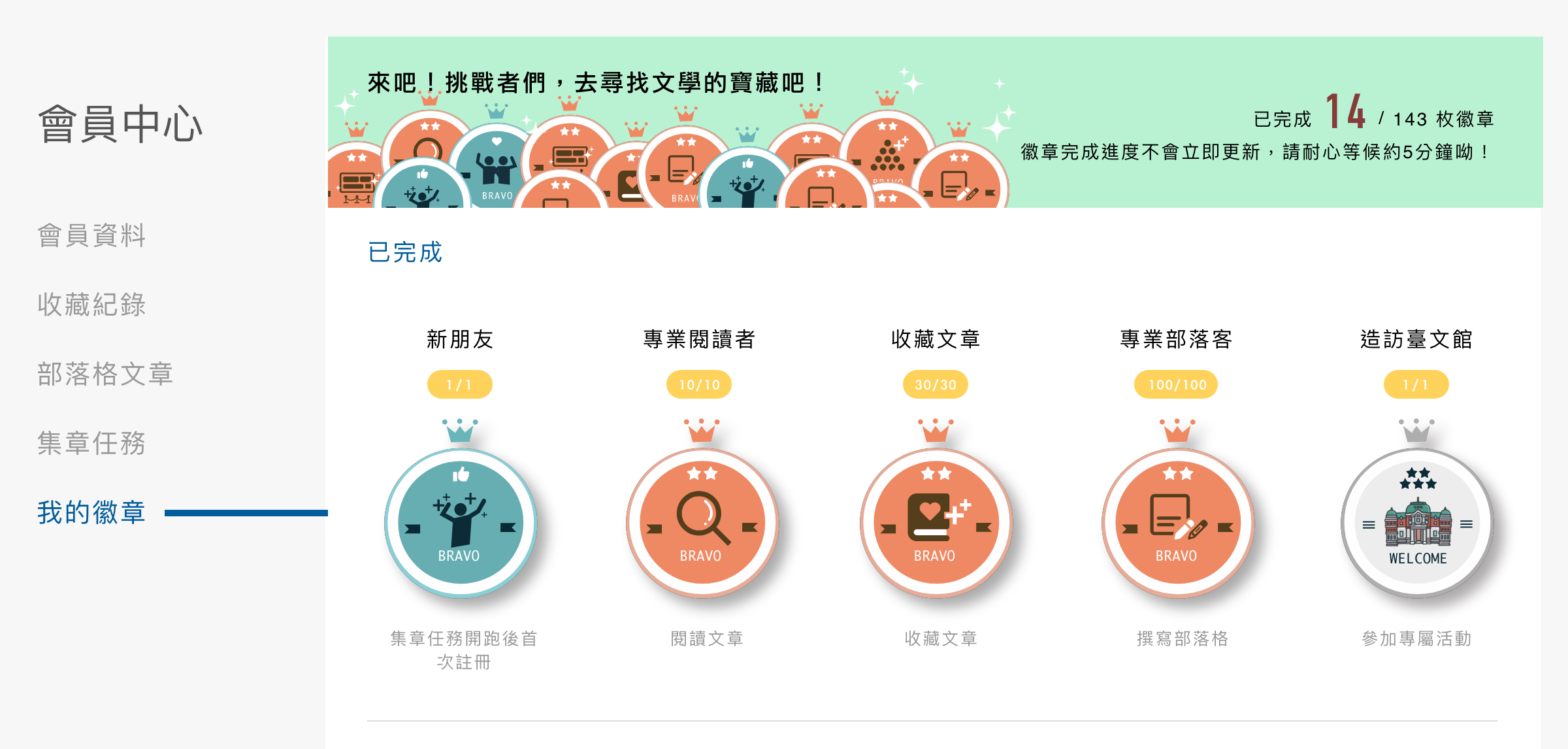Tongues Controlled ⭔ Martial Fantasy is also Taboo ⭔ "Fun Facts": Banned Songs
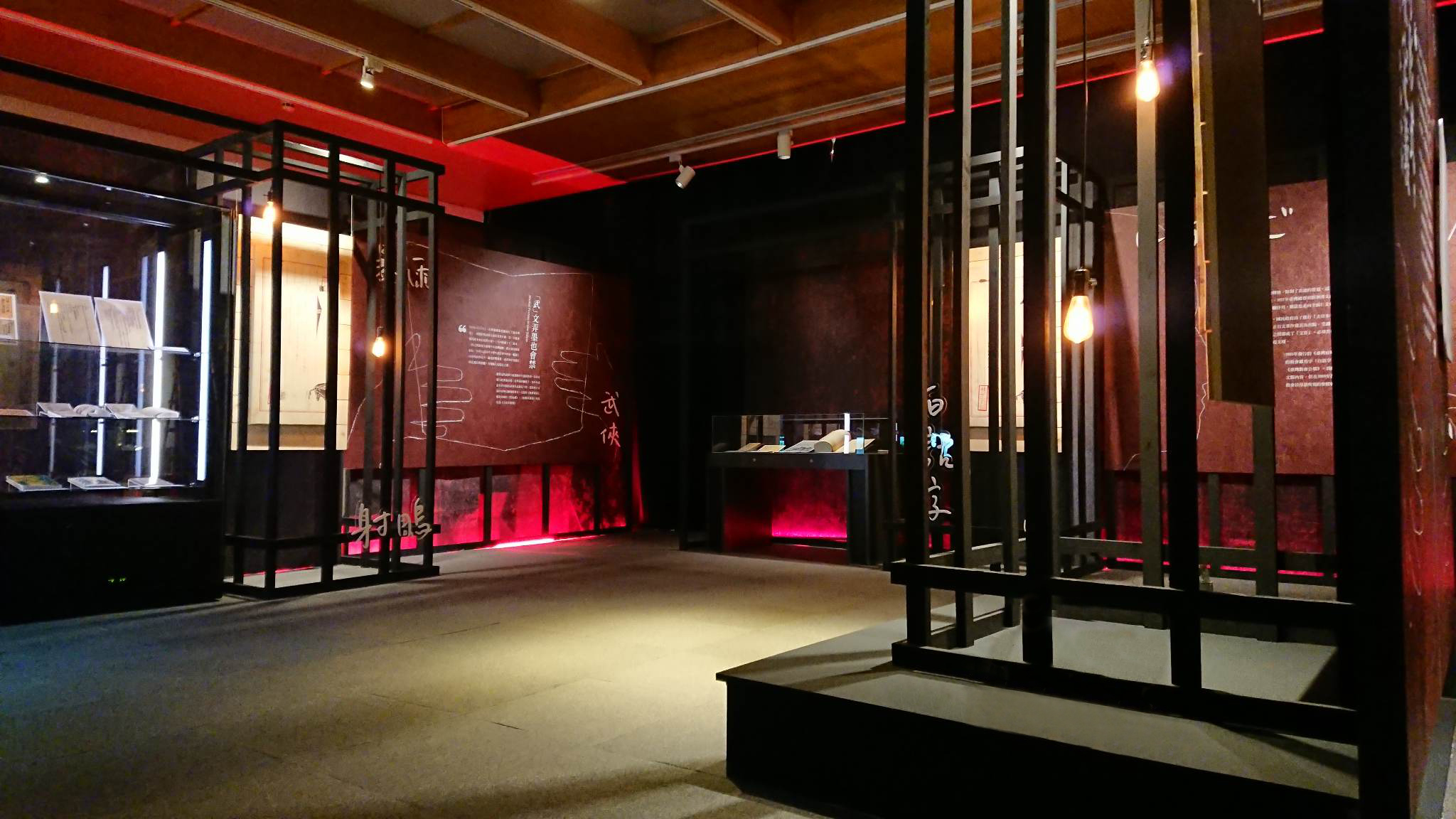
In the late 1930s, the Japanese colonial government launched the Southward Advance Policy. As Taiwan became an important strategic point, The Kōminka Movement (Japanization) began in Taiwan; written Chinese was restricted, Taiwanese plays were banned, Taiwanese radio programs were forbidden, the Taiwanese language was disallowed, people's names were changed, and visiting shrines became mandatory. After WWII, the Nationalist government forcefully "uprooted Japan and implanted China," aiming to nurture the "ideal" civilians.
Apart from languages, literature and songs were also targets of censorship. The authoritarian government strictly restricted any form of self-expression to control public thought. Due to the law, people could only use one language. Even literature and songs were largely restricted. For example, the "Rainstorm Project" aimed to censor wuxia (martial hero) novels. These novels ostensibly portray the unrealistic life of jianghu (the world of martial heroes). The stories often involve revolts against the authority; therefore, the government was highly cautious about these novels.
In the meantime, the rapid and wide dissemination of songs made them inevitable targets of censorship. Banned songs and books were the biggest victims of the "literary inquisition" during the martial law period.
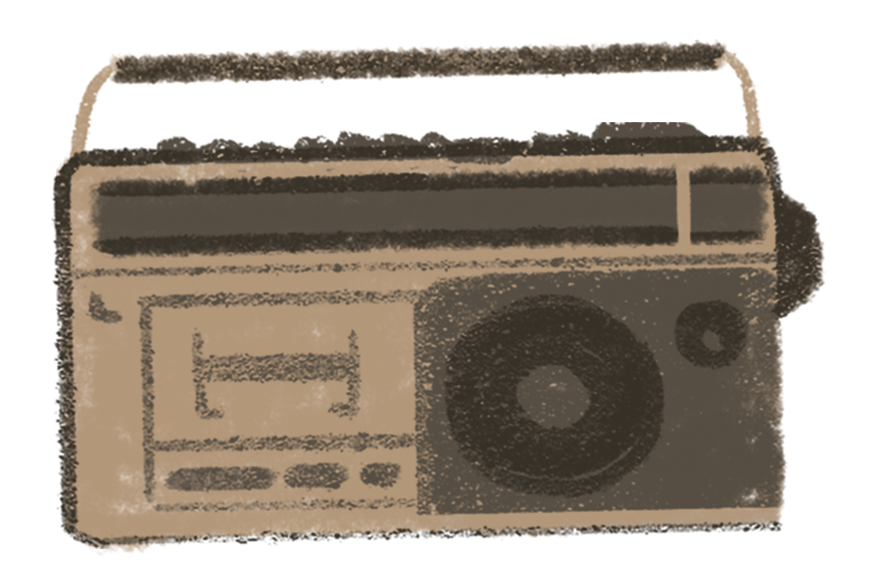 Tongues Controlled
Tongues Controlled
Forcefully imposing a new language for writing restricted people's ways of expressing themselves. This is a common means adopted by authoritarian governments. In 1937, Governor-General of Taiwan restricted publications written in Chinese, resulting in the Chinese sections of newspapers being suspended. Meanwhile, magazines were being published fully in Japanese.
In 1945, right after WWII, the Nationalist government prohibited the release and publication of Japanese writings to "uproot Japan and implant China. " Taiwanese people who received a Japanese education suddenly became illiterate. They had to study Chinese hard in order to return to the literary scene.
TÂI-OÂN HÚ SIÂⁿ KÀU HŌE PÒ, founded in 1885, was written and published in Pe̍h-ōe-jī (a.k.a. Church Romanization), which was introduced by Western missionaries. In 1955, it was renamed TAIWAN CHURCH NEWS. To comply with the "Mandarin Movement," Chinese content was added. However, in 1969, it was prohibited from being published in Romanization. The Bible and hymns written in Pe̍h-ōe-jī by local churches were also confiscated.
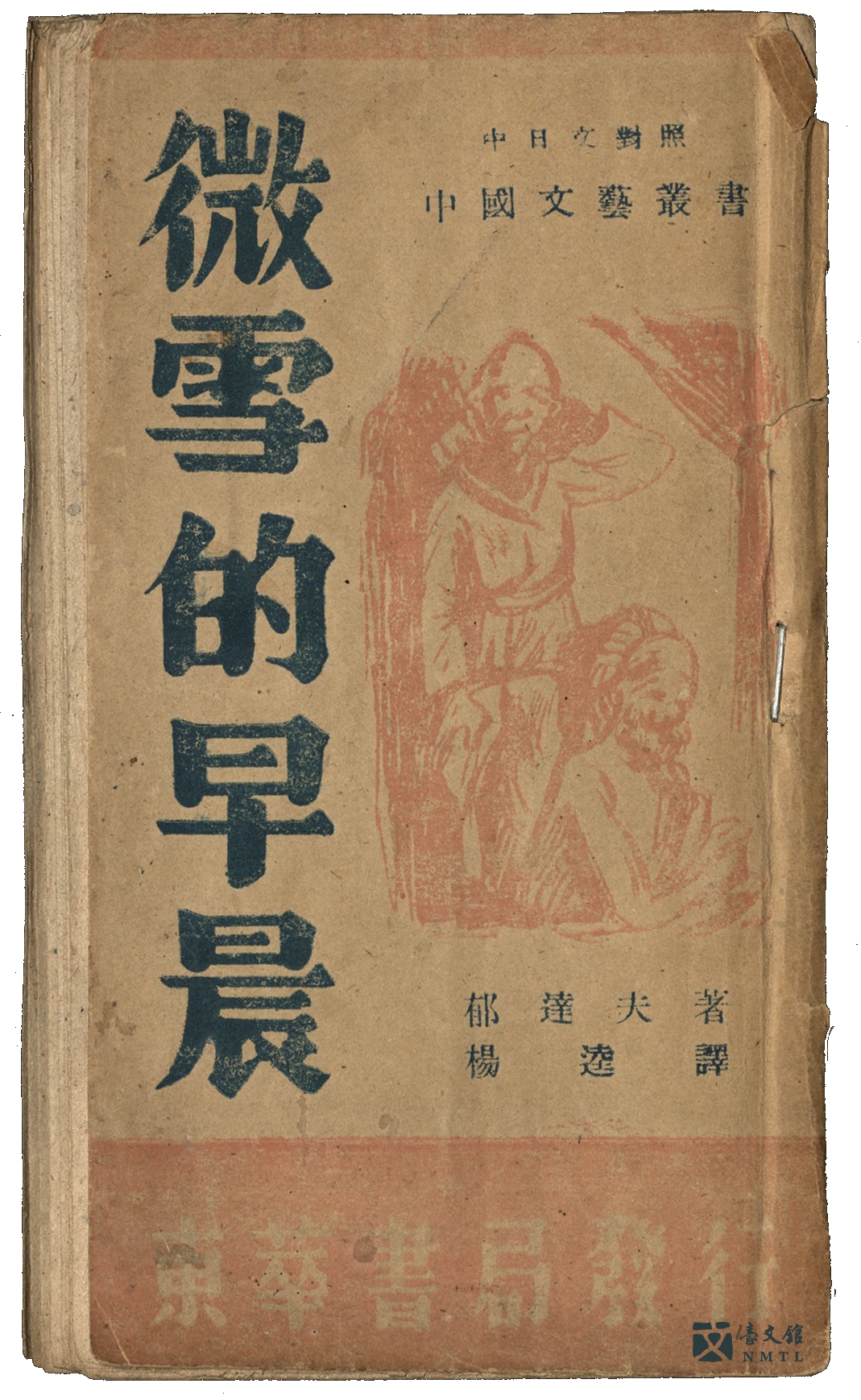
◰ SNOWY MORNING, written by Yu Da-fu and translated by Yang Kuei
This book includes Yu Da-fu's "Flight" and "Snowy Morning." It also contains Yang Kuei's Japanese translation. Presented in both Chinese and Japanese, the book made it easier for people who were still in the process of getting accustomed to another language. In 1946, the Nationalist government launched the Chinese movement and Japanese was prohibited. This book was thus banned.(Kept in National Museum of Taiwan Literature)
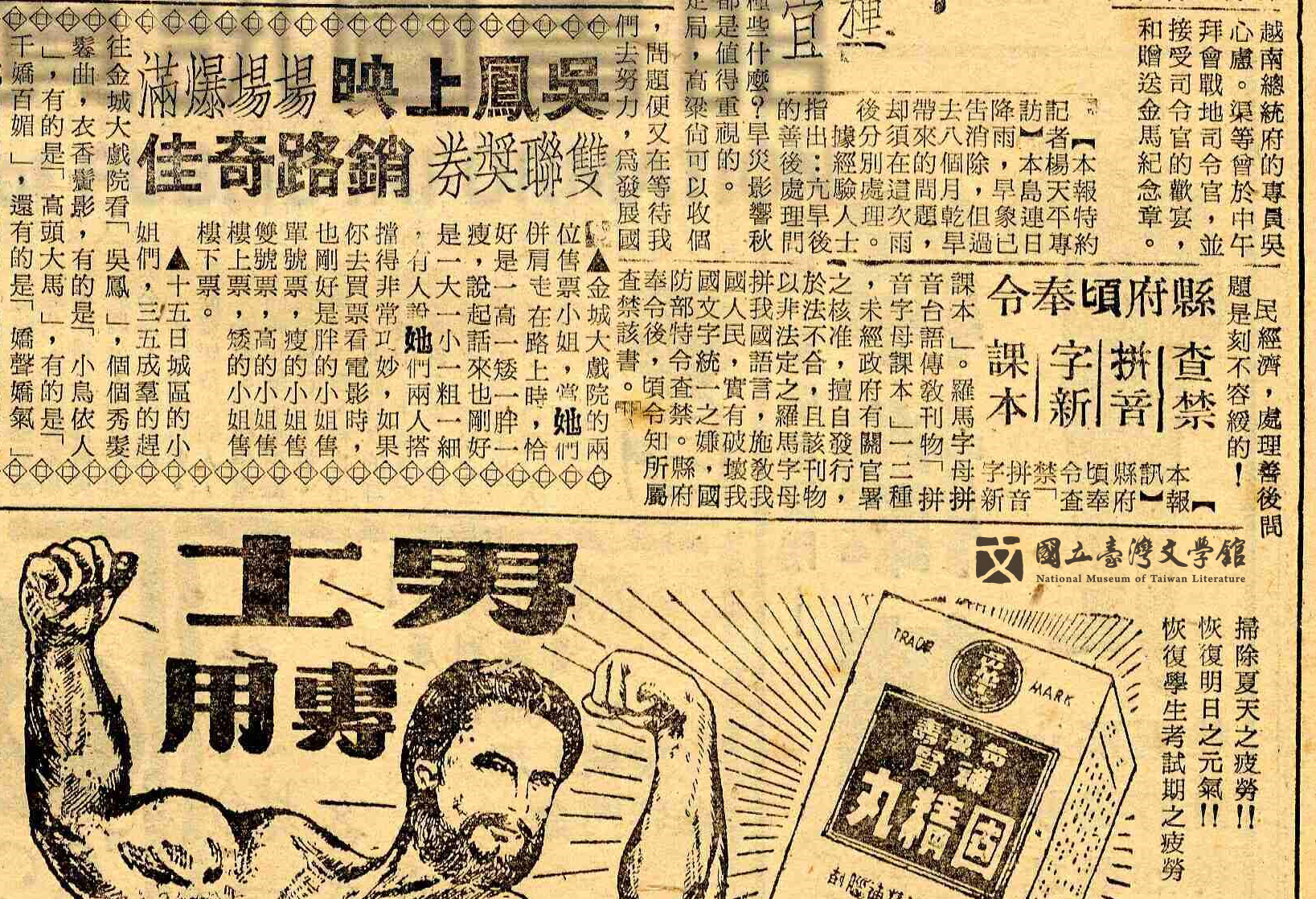
◰ "The County Government Instructed to Ban Textbooks Written in Pe̍h-ōe-jī." CHENGCHI CHUNGHWA PAO. June 17, 1963.
After WWII, the Nationalist government launched the Chinese movement and suppressed the development of other languages. The Church Romanization of Taiwanese, which was developed in the 19th century in Taiwan, was also targeted. The government banned teaching materials related to Church Romanization for the reason that it would "hinder the promotion of the official writing system."(Authorized by the Digital Archives Service, National Library of Public Information)
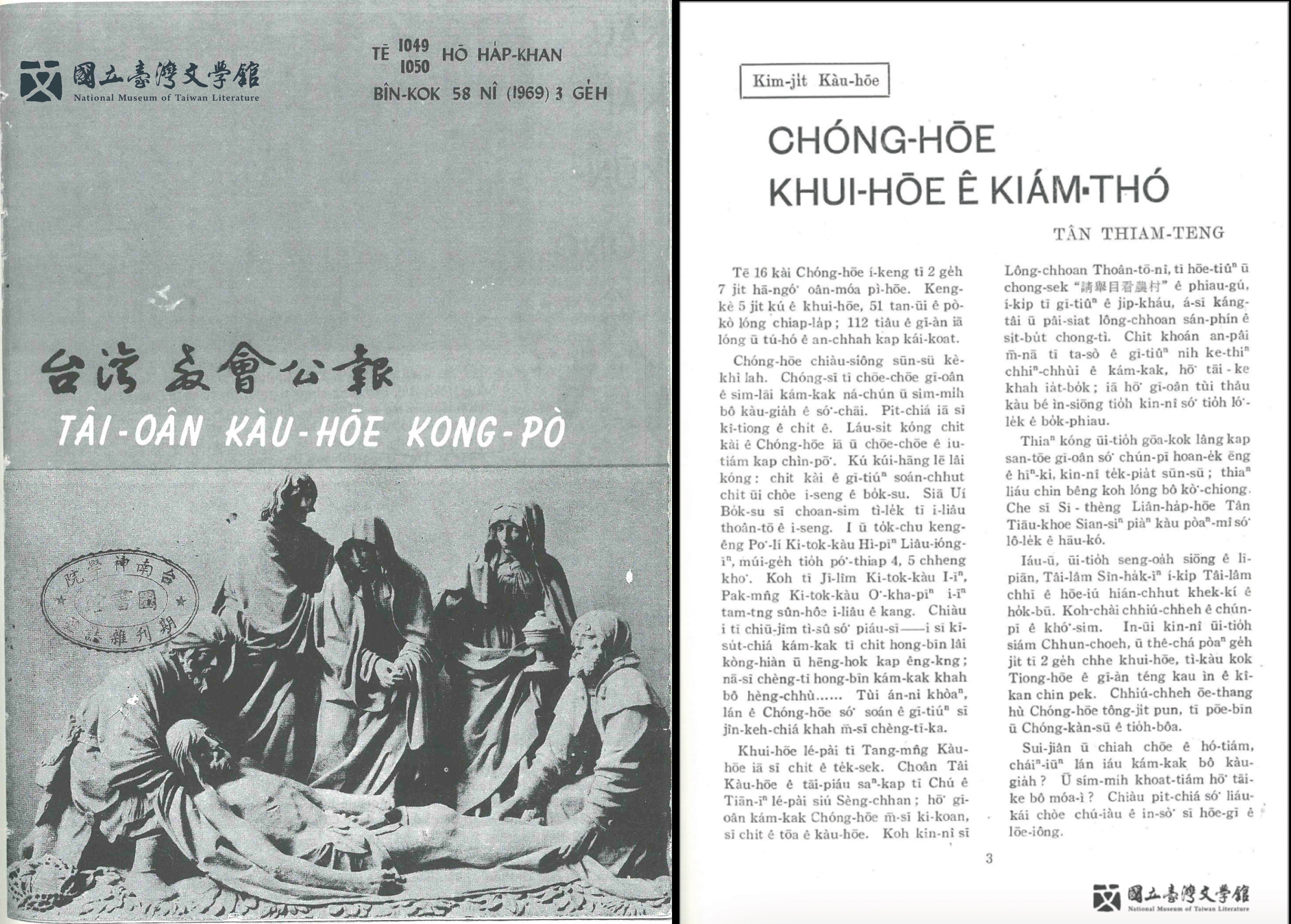
◰ TAIWAN CHURCH NEWS No. 1049 and 1050 Joint Issue
With the introduction of the Mandarin Movement led by the Nationalist Government, the publisher of TAIWAN CHURCH NEWS took several measures in response. For instance, the Church Romanization edition of TAIWAN CHURCH NEWS also included the Mandarin supplement YING GUANG. TAIWAN CHURCH NEWS Issue No. 1049 and 1050 were the last issues published in Church Romanization in 1969.(From the collection of the library at the National Museum of Taiwan Literature)
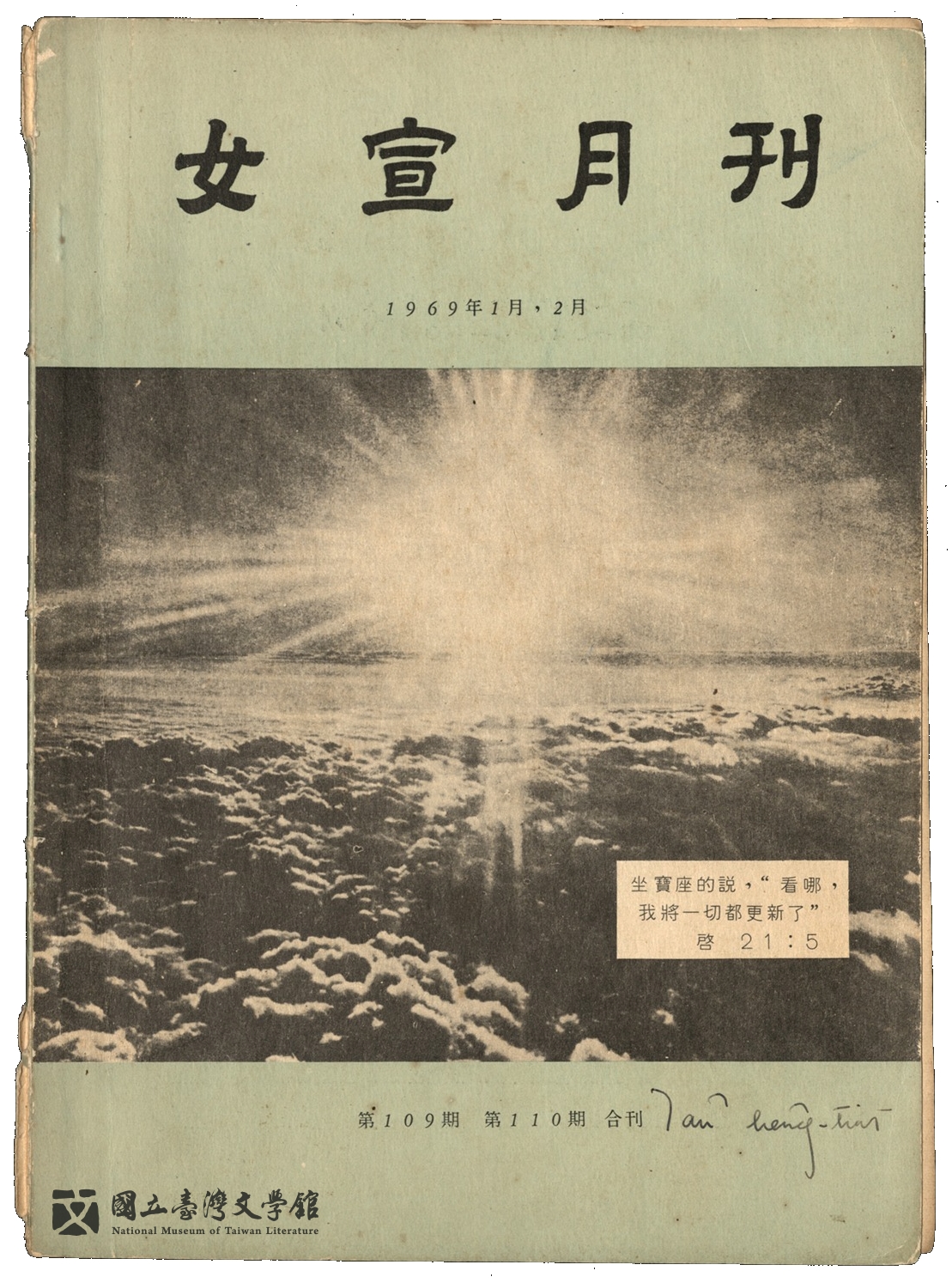
◰ Combined Edition of Issues 109 and 110 of WOMEN'S MONTHLY
In 1969, the Nationalist government forbade the use of Pe̍h-ōe-jī. While negotiating with the authority, WOMEN'S MONTHLY changed its layout; the content was presented in both Pe̍h-ōe-jī and Chinese. In the end, the Nationalist government still decided to completely ban Pe̍h-ōe-jī. (Kept in National Museum of Taiwan Literature)
Martial Fantasy is also Taboo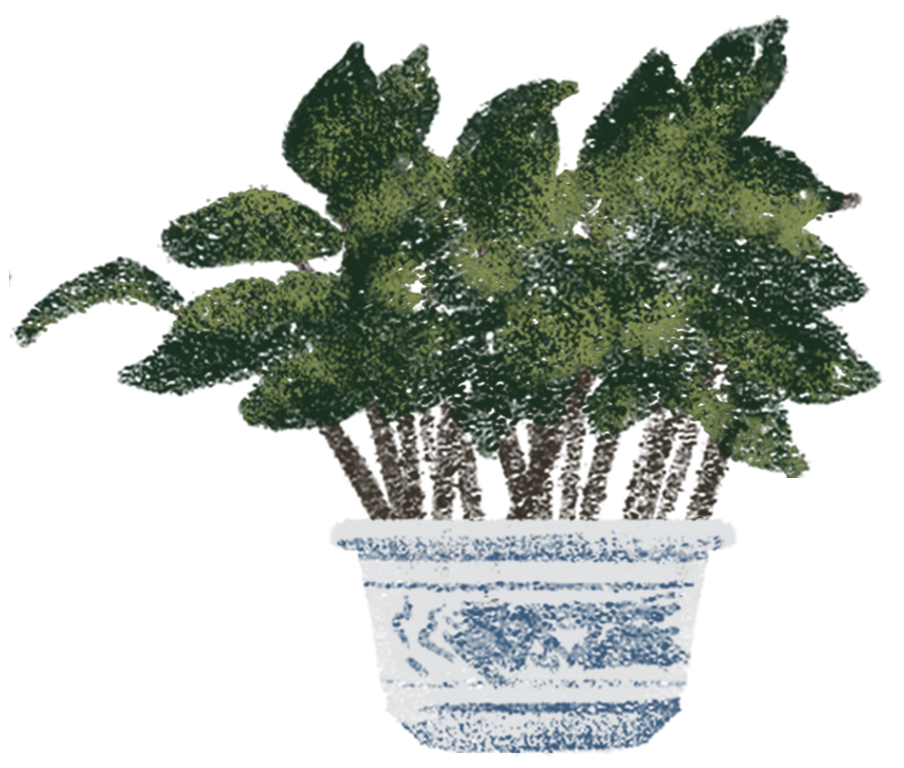
The Rainstorm Project, planned and executed by the Taiwan Garrison Command on December 31, 1959, aimed at censoring wuxia (martial arts) novels. On the first day, over 40,000 wuxia novels were tracked down. Within three days, 120,000 novels were seized. Within a short time, wuxia novels almost disappeared in Taiwan. The real reasons behind this were unknown. Some thought it was because students skipped class and went into mountains to look for martial arts professionals after reading these novels; others thought it might be because of the chivalrous values promoted by the books, which were considered to incite civilian riots.
Though these novels were banned officially, there was still a large fan base. Driven by profit, publishers frequently printed illegally or republished wuxia novels with other authors' names or titles. Huanzhulouzhu used the name Liu Can-yang in the illegally printed copies of his works. THE SOUND OF A PAN FLUTE AND THE SHADOW OF A SWORD, written by Yulang, was actually Jin Yong's SWORD STAINED WITH ROYAL BLOOD; THE LEGEND OF THE CONDOR HEROES was renamed UNSUNG HEROES OF THE WILDERNESS.
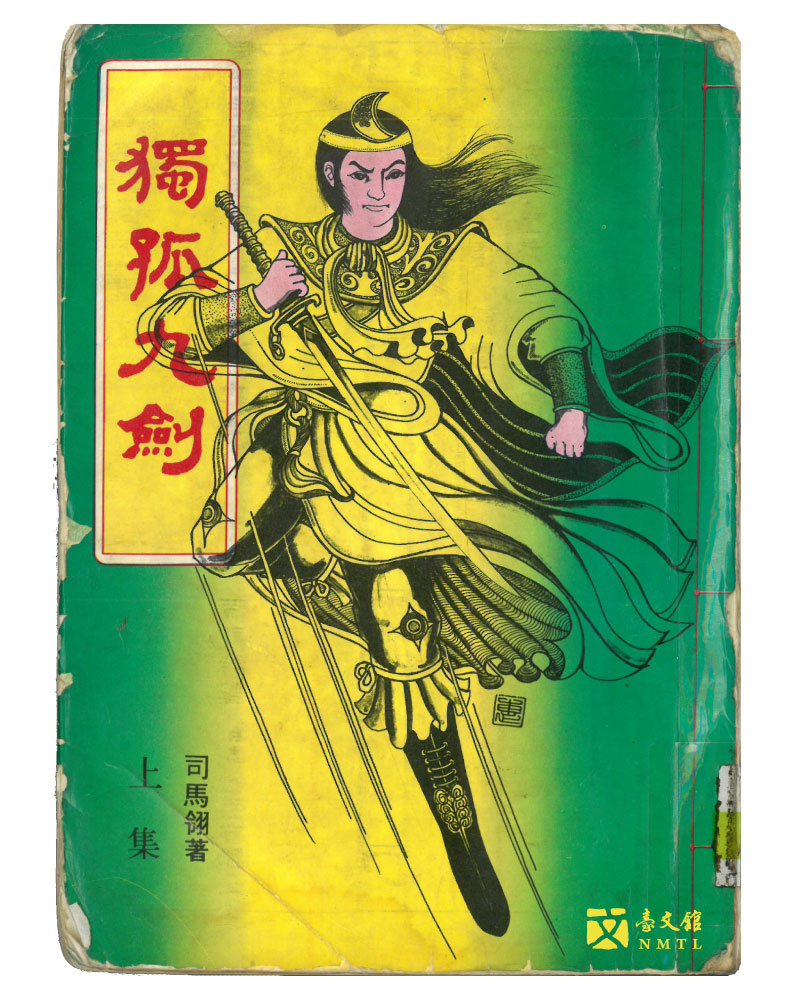
◰ DUGU NINE SWORD by Sima Ling
The original book was Jin Yong's THE SMILING, PROUD WANDERER. Since Jin Yong was at the top of the list of the "Rainstorm Project," the publisher had to change the author to Sima Ling, another famous wuxia writer. DUGU NINE SWORD is the lethal martial technique that the leading hero Ling-Hu Chong of THE SMILING, PROUD WANDERER learns, implying its relation to the original book.(Authorized by National Taiwan Library)
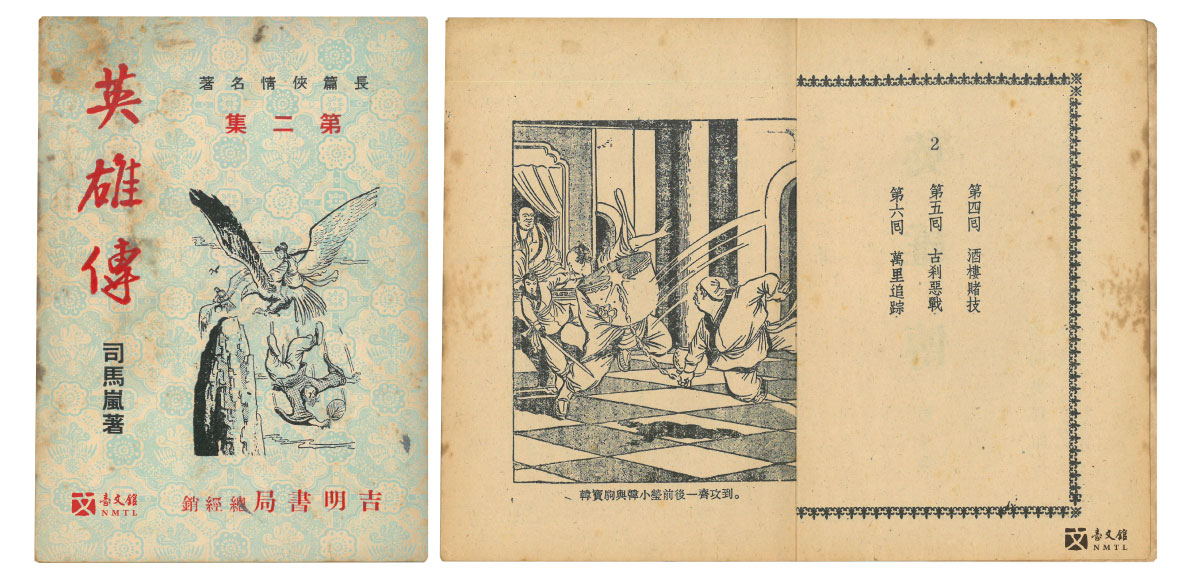
◰ THE LEGEND OF THE HEROES by Sima Lan
The book was originally Jin Yong's THE LEGEND OF THE CONDOR HEROES. The publisher changed the title to THE LEGEND OF THE HEROES and the author's name to Sima Lan.(Provided by Huang Zhe-yong)
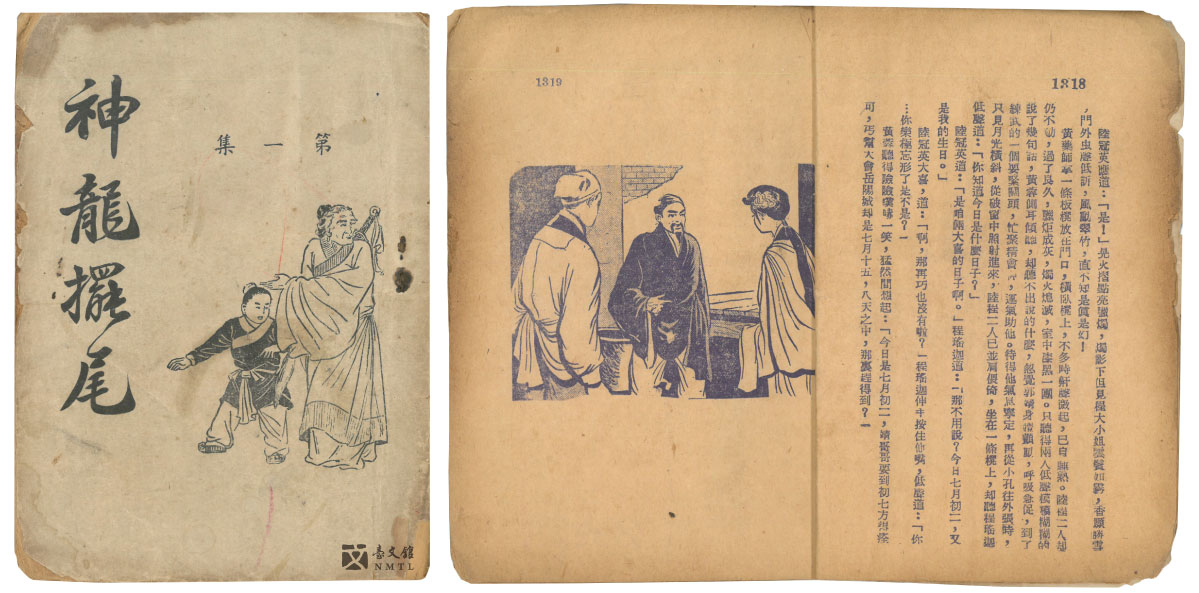
◰ DRAGON SWAYING ITS TAIL
The book was originally Jin Yong's THE LEGEND OF THE CONDOR HEROES. The publisher changed the title to DRAGON SWAYING ITS TAIL, which is a chapter title of the book. The author's name was also removed.(Provided by Huang Zhe-yong)
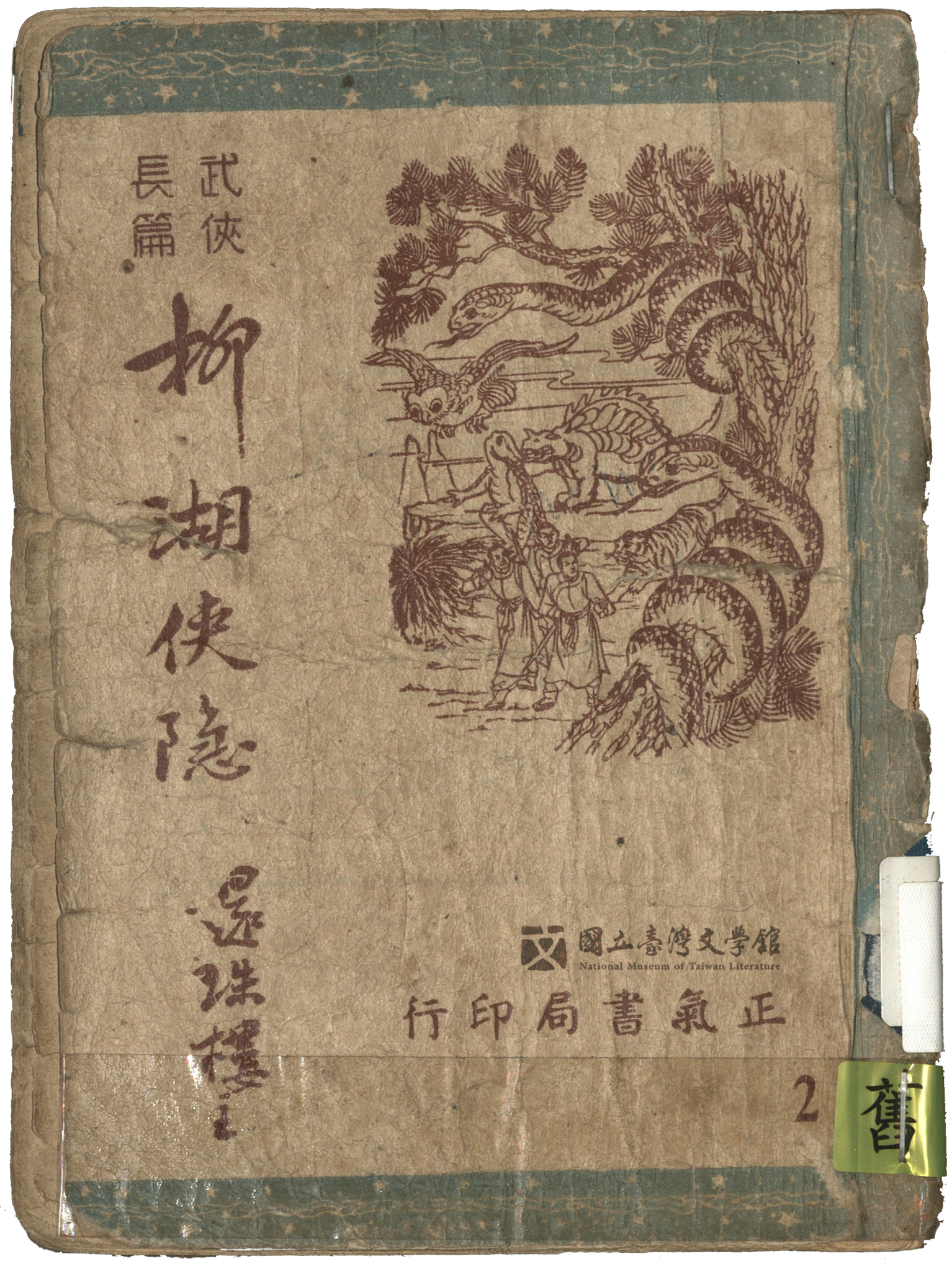
◰ BLADES FROM THE WILLOWS by Huanzhulouzhu
In the Rainstorm Project, all works by wuxia novelists that stayed in China and Hong Kong were banned. Huanzhulouzhu's works were also no exception. According to past records, his works had been seized by the government in the years following 1951. (Provided by National Central Library)
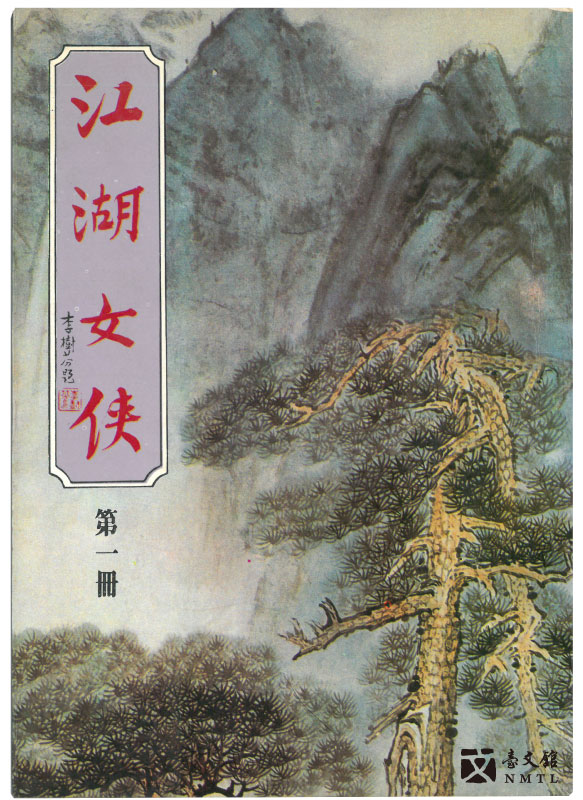
◰ Liang Yu-sheng's JIANGHU HEROINE
It was originally Liang's THREE HEORINES, which was published in instalments in DA GONG BAO in the 1950s. DA GONG BAO was a leftist newspaper. Liang worked there and published his works there, so his wuxia novels were also banned.(Provided by Huang Zhe-yong)
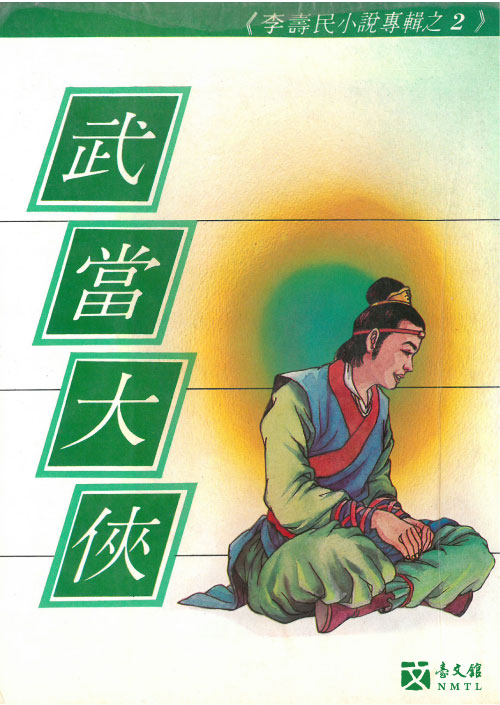
◰ Li Shou-min's WUDANG HERO
This wuxia novel was written by Huanzhulouzhu. The publisher published it using the author's real name Li Shou-min to avoid it being banned.(Provided by Huang Zhe-yong)
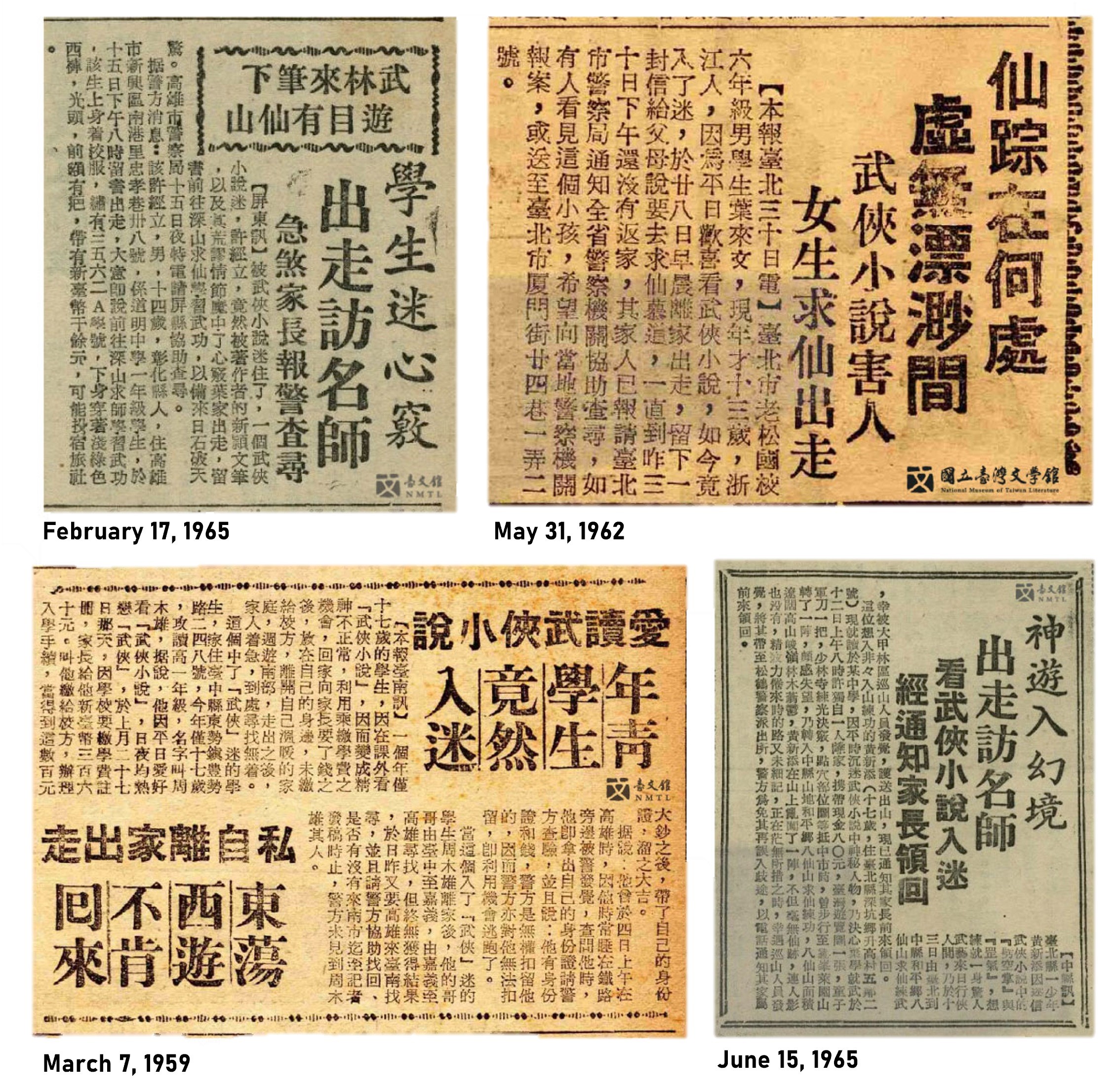
◰ News Articles Related to Wuxia Incidents from TAIWAN MINSHENG DAILY
Wuxia novels were increasingly popular in Taiwan. Incidents of young students going into mountains to look for immortals and practice martial arts were often reported in newspapers, reflecting the problems these novels caused in society at the time.
1."Students Go into Mountains due to Obsession with Wuxia Novels; Parents Ask Police For Help" February 17, 1965
2. "Wuxia Novels Harmful, Students Run Away from Home to Seek Immortality" May 31, 1962
3. "Students Obsessed with Wuxia Novels Run Away from Home with Money for Tuition" March 7, 1959
4. "Student Lost in Mountains After Reading Wuxia Novels; Police Contact Parents to Pick Up" June 15, 1965
(Authorized by the Digital Archives Service, National Library of Public Information)
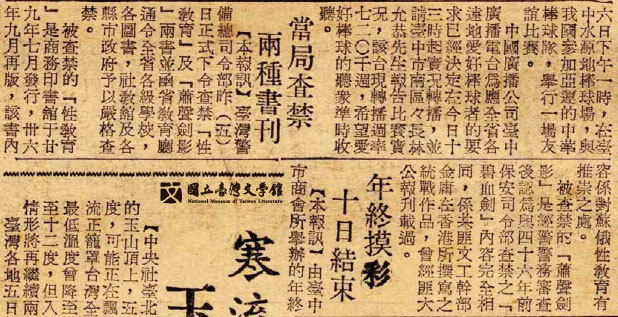
◰ "Two Types of Books Banned by Authority," TAIWAN MINSHENG DAILY, January 6, 1959
Though Jin Yong's works were banned, his work SWORD STAINED WITH ROYAL BLOOD was renamed THE SOUND OF A PAN FLUTE AND THE SHADOW OF A SWORD for publication. The report also mentions that the book SEX EDUCATION was banned because it was associated with the Soviet Union instead of its association with sex.(Authorized by the Digital Archives Service, National Library of Public Information)
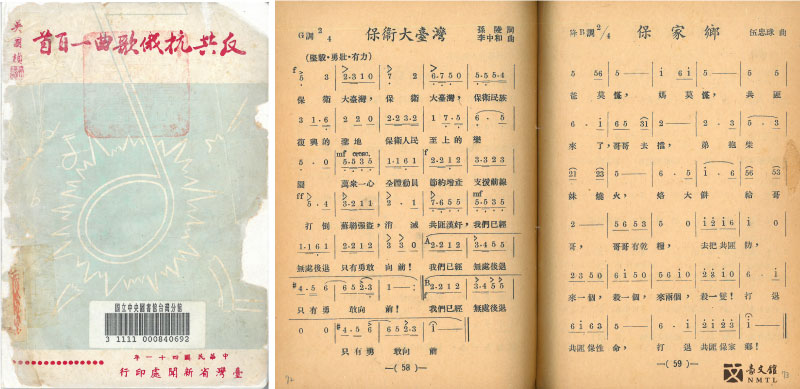
◰ "Protecting Taiwan"
Written by Sun Ling, this poem was originally published in NATIONAL NEWS in 1949. Later on, Li Chung-ho composed a song for the poem. It was then known as the "most important song in anti-communism literature." After music was added, it was officially banned since the song title sounded similar to "surround and attack Taiwan." It was included in 100 SONGS OF ANTI-COMMUNISM AND SOVIET UNION.(Authorized by National Taiwan Library)
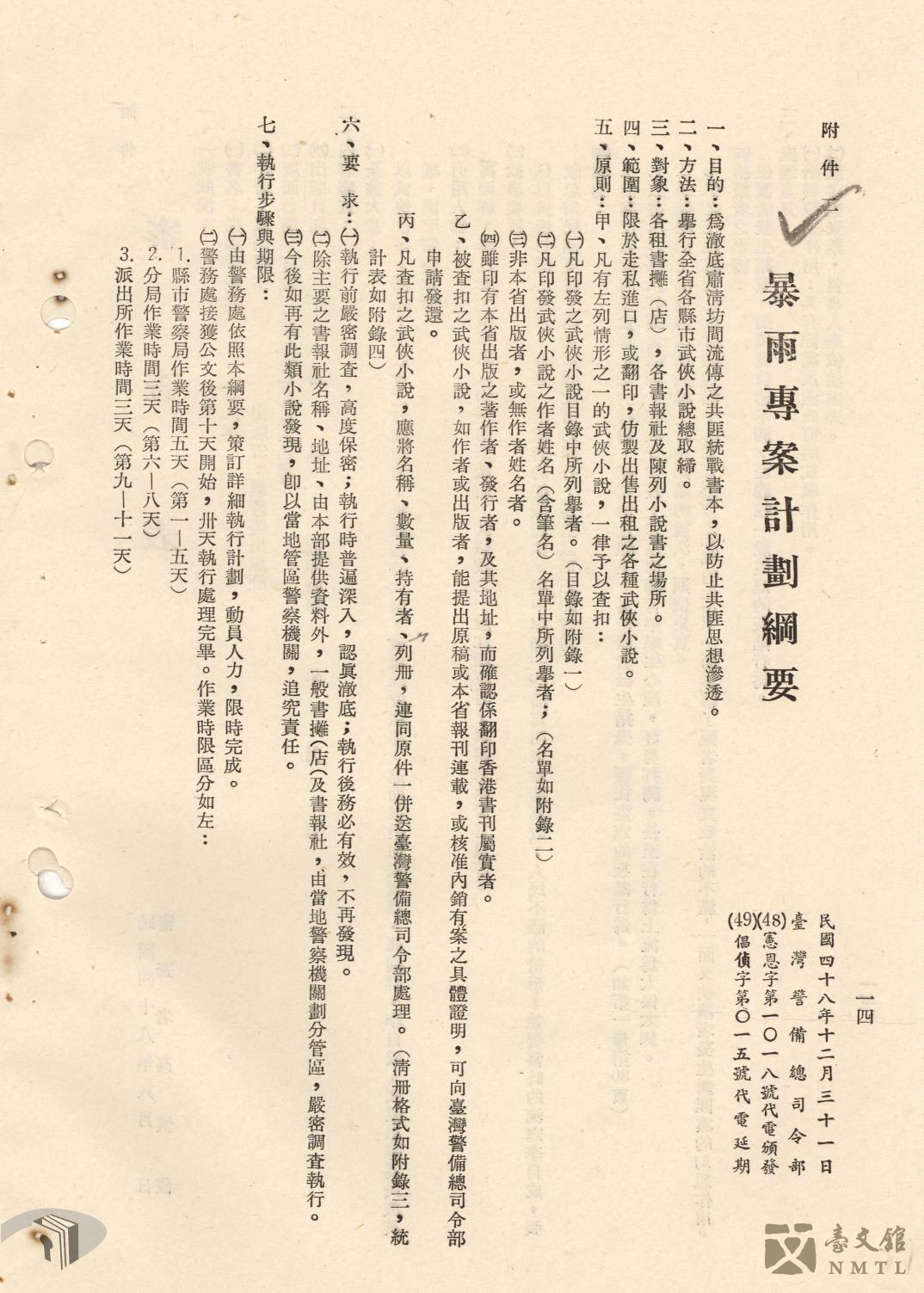
◰ "Overview of The Rainstorm Project"
In December 31, 1959, the Taiwan Garrison Command launched the Rainstorm Project, which aimed at seizing all wuxia novels. The overview contains the standards for seizure, procedures, and categories. In the step-by-step analysis of the project, Jin Yong and Liang Yu-sheng were also listed as the leaders of the "Communist Cultural United Front Work."(Authorized by Archives Access Service)
"Fun Facts"
Banned Songs
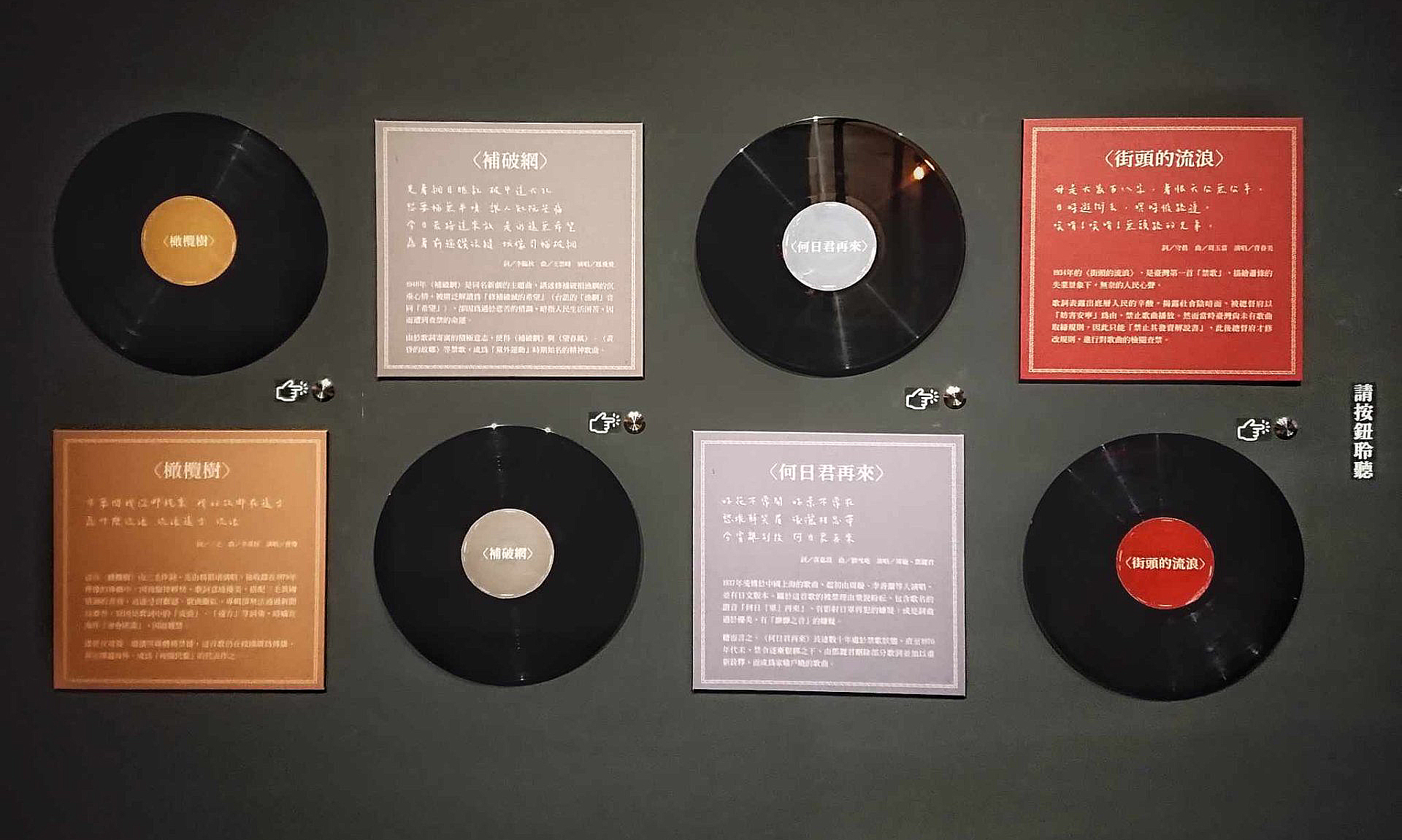
Good songs are catchy; they also spread faster than literary works. Therefore, songs that were not welcomed by the regime were also banned like books. The earliest banned song we know now was "Roaming In the Street," performed by Tshenn Tshun-bi in 1934. The song was banned because of its depiction of the problems in society at the time, which damaged the image of the Japanese colonial government.
There were a even larger number of banned songs after WWII. The list can be found in the BANNED SONGS, compiled by the Taiwan Garrison Command. The reasons for banning included "song being too Japanese," "lyrics being too disheartening," "the ambience being too indulging," or even "promoting communism." Sun Ling was known for his anti-Communist poetry "Protect Taiwan." It was supposed to be a representative anti-Communist work; however, after the music was added, the line "protect Taiwan" sounded like "surround and attack Taiwan," leading to the song being banned.
The Taiwanese song "Mother, Please Take Care of Yourself" describes a child's yearning for his mother as he works far away from home. However, this song was banned for being too "disheartening." Songs that were too sad were not allowed; songs that were too happy were also not permitted. The song "Don't Leave Even Enough For A Goldfish" encourages people to drink up all the alcohol. The song was banned as it was considered depraved by promoting alcohol consumption. Only after martial law was lifted was music censorship gradually loosened.
◰ "Roaming in the Street" (Lyrics by Shou Zhen; Music by Zhou Yu-dang; Performed by Tshenn Tshun-bi)
"Roaming in the Street," released in 1934, was the first banned song in Taiwan. It describes the helplessness of people against the backdrop of economic recession. The lyrics reveal the hardship of people from the lower class and the dark sides of society; it was banned by the Government-General of Taiwan for "disturbing peace." As there were no rules for censoring songs in Taiwan, the only way to do so was to "ban the sale of interpretation booklets." Afterwards, the Government-General of Taiwan changed the rules in order to censor songs.
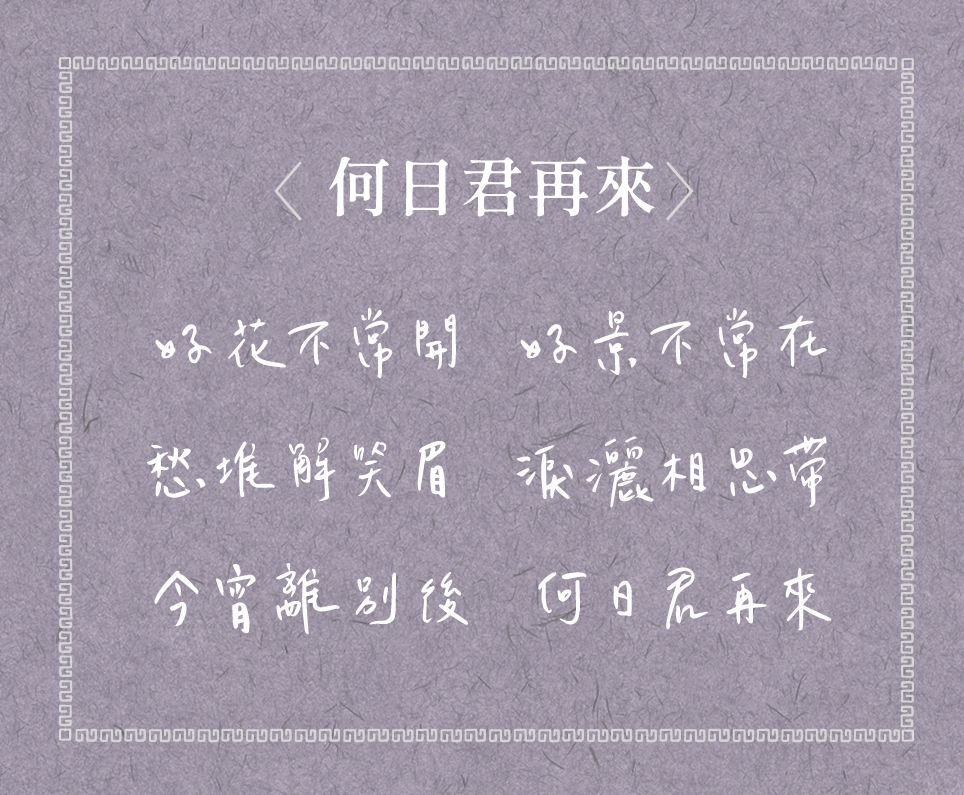
◰ "When Will You Return" (Lyrics by Huang Chia-mo; Music by Liu Xue'an; Performed by Zhou Xuan, Teresa Teng )
It was a popular song in Shanghai in 1937. In the beginning, it was performed by Zhou Xuan and Li Xiang-lan. It also had a Japanese version. The reasons that this song was banned were uncertain. It might be because the song title was considered to sound like "when will the 'army' return," implying the return of the Japanese army. It might also be because the lyrics and music were too beautiful, causing it to be banned for being "demoralizing." All in all, for decades, "When Will You Return" had been banned. At the end of the 1970s, restrictions were gradually loosened. Teresa Teng deleted some of the lyrics and recorded a new version, making the song widely-known in Taiwan.
◰ "Repairing the Torn Net" (Lyrics by Lee Lim-chhiu; Music by Wang Yun-feng; Performed by Fong Fei-fei )
In 1948, "Repairing the Torn Net" was the theme song of a drama of the same name. The song describes the feeling of unhappiness while repairing a torn net. It was generally seen as a song about "repairing a broken hope" ("fishing net" in Taiwanese sounds like "hope"). However, the song was banned for its overly sorrowful melody and depiction of the hardships of everyday people. The lyrics convey a sense of proactivity, so the song, along with "Longing for the Spring Breeze" and "Hometown in the Sunset," became widely known during the "Tangwai movement."
◰ "Olive Tree" (Lyrics by Sanmao, Music by Li Tai-hsiang, Performed by Chyi Yu )
The lyrics of OLIVE TREE were written by Sanmao. It was first performed by Yang Tsu-chuen. Later on, it was included in Chyi Yu's album in 1979. The song has an upbeat melody and beautifully-written lyrics. With Sanmao's exotic lyrics, the song soon became popular. Although the song was popular, the album was unable to pass the review conducted by the Government Information Office because words such as "wandering" and "faraway" were seen as metaphors for "secret meetings with Communist spies abroad." Though this song was banned on TV and radio, it was still popular among students and spread to other countries becoming one of the representative "campus folk songs."
